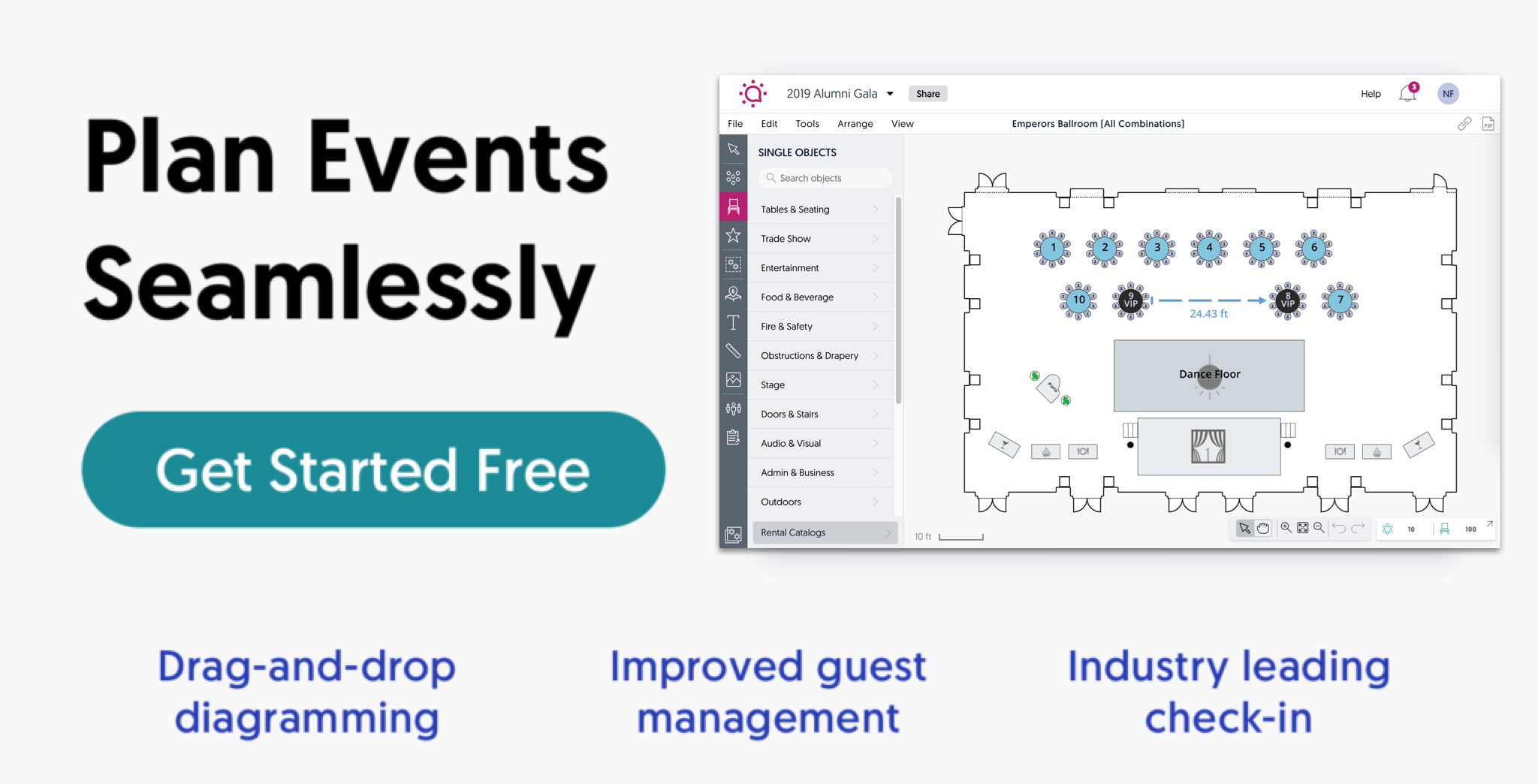
Wedding Planner Marketing: 7 Tips to Boost Your Business
Approximately 2 million weddings take place in the U.S. each year and, according to Wedding Wire, nearly one in three couples hire a wedding planner for their big day. In other words, the wedding industry is massive, and wedding planners are faced with tons of competition. Wondering how to stand out and boost your wedding planning business? That’s where wedding planner marketing comes in.
In this post, we take a deep dive into ways wedding planners can market themselves to reach more couples. We also provide examples of planners and organizations throughout the industry who stand out in their marketing efforts, because what better way to learn than by example?
Explore 7 wedding planner marketing tips you need to know:
1. Know your audience.
Before making any changes to your marketing efforts, determine ” or re-evaluate ” who it is you’re marketing to. It’s crucial that you not only have a target audience, but that you direct the majority of your marketing to that audience, too. For example: Are you constantly planning weddings for young couples? Make sure your marketing materials are being shared across the channels that those young couples use, such as Pinterest, Instagram, and TikTok. Do you specialize in destination weddings? Build relationships with vendors and venues located in popular destinations as opposed to small towns and rural areas. While this varies from planner to planner, and there’s no perfect formula, it can make all the difference when it comes to the success of your marketing strategy.
2. Make your website user-friendly and create compelling content.
It all starts with your website. This is the central hub for any and all things related to your business. It’s where first impressions are made. Where business is earned. Where all your hard work lives. Don’t believe us? Take a look at these statistics noted by SWEOR.
- It takes less than a second for users to form an opinion about your website.
- Thirty-eight percent of people will stop engaging with a website if the content or layout is unattractive.
- Seventy-five percent of consumers admit to making judgments about a company’s credibility based on website design.
- Nearly 8 in 10 consumers stop engaging with content that doesn’t display well on their device.
- Sixty-one percent of users are unlikely to return to a site on mobile if they had trouble accessing it, and 40% visit a competitor’s site instead.
Not only does your website have to be visually appealing and provide a good user experience, but it has to feature compelling content, too. Content is defined as “something that is to be expressed through some medium, as speech, writing, or any of various arts.” When it comes to wedding planners, it can be anything from promotional videos and infographics to social media surveys and email newsletters. But it goes much further than that. Creating content is one thing. Creating content that engages your audience and leads to new business is another thing entirely.
Take renowned wedding planner Mindy Weiss, for example. Her website is clean, well-designed, and easy-to-navigate. She has an “about” page, photo galleries, and a blog, which features content written by Weiss herself.
3. Prioritize SEO.
Having strong search engine optimization goes hand in hand with producing stellar content. You can certainly have one without the other, but those efforts will only get you so far. When combined, the strength of your marketing strategy skyrockets. Here are a few key ways to boost your SEO:
- Use well-researched target keywords. Proper keyword use is one of the most important factors when it comes to SEO. For example, take a look at Chancey Charm’s Washington, DC planning team. Their website ranks on the first page of Google’s search results for the term “Washington DC wedding planner” because they use that term as their target keyword. The exact term appears in the page title and two on-page headlines, while variations of the term ” like “DC wedding planners” ” appear in the on-page text. Use tools like Google Keyword Planner to determine which keyword or keyword phrase is right for each page on your site
- Prioritize page-by-page optimization. Whether it’s your blog, homepage, contact form, or anything in between, each page on your site serves a difference purpose. To boost your chances of being found, each of those pages should be properly optimized. For example, ensure that each blog post not only has a target keyword, but that you’re using that keyword in the page title, on-page text, URL, meta description, and even image alt tag, if applicable.
- Boost your site/page speed. Loading time is an incredibly important factor for both user experience and SEO. According to Google research, bounce rate increases 32% for pages that take 1-3 seconds to load, 90% for pages that take 1-5 seconds to load, and so on. Simply put: You’re not going to bring in new clients if they don’t even stick around for your website to load.
4. Establish a strong social media presence.
While social media doesn’t drive as much traffic as organic search, it’s still one of the most important things to focus on when building a brand. This couldn’t be more true for the wedding industry. Take a look at Pinterest, for example. The social media giant states that 40 million people per year utilize the platform during the wedding planning journey. How’s that for opportunity?
Here are a few tips for boosting your social media game:
- Post often. But not too often! The key is consistency. Don’t post just to post, but also don’t go days without sharing anything. Find the right balance based on your following, and be sure that you’re only sharing quality content.
- Focus on multiple platforms. You should, of course, hit the big ones: Instagram, Pinterest, Twitter, and Facebook. There’s also tons of value on YouTube and TikTok. But be sure you don’t bite off more than you can chew. Map out a plan for each platform and go from there. Don’t. have accounts that you don’t have time for. That leads to inactivity, which leads to a bad user experience and, potentially, the loss of a future customer.
- Use hashtags. An Instagram post with at least one hashtag gets 12.6% more engagement than a post without one. Using them is very valuable, but don’t overdo it. Narrow down a handful of relevant options for each post.
- Interact ” and be interacted with. High engagement (the amount of likes, comments, etc. on a post) is important when it comes to increasing conversion rate. Additionally, person-to-person social media interactions (i.e. a wedding planner responding to a comment left on a photo) is also great way to increase awareness and forge relationships.
- Don’t be afraid to mix things up. If every tweet you share is a regurgitation of a blog post’s headline, your feed can get boring very quickly. While it’s important to stay on theme and on brand, you have to find ways to stand out, too. For example, a Twitter study of 3.7 million users showed that tweets with a GIF gained 55% more engagement than those without. So throw some GIFs out there and have some fun, but also remember that nobody wants to follow someone who shares a GIF with every post. It’s all about balance.
- Add links. You need to make it as easy as possible for potential clients to learn more about you and, hopefully, reach out. Add a link to your website in all of your social media bios, as well as relevant links in the majority of your posts on all platforms.
5. Leverage testimonials and reviews.
Reviews are one of the most important factors couples consider when deciding who to reach out to while planning their wedding. In fact, according to Wedding Wire, 80% of couples consider reviews to be “very important,” and couples are more likely to consider booking with a vendor that has both positive and negative reviews than no reviews at all.
Of course, asking a client to write a review can be awkward. But according to a Bright Local study, 85% of consumers are willing to leave reviews. What’s more, 60% of consumers have written reviews for positive experiences, while just 20% have written reviews for negative experiences.
Once you receive those positive reviews, don’t be afraid to toot your own horn. Without making it spammy, share reviews and testimonials on your social media platforms and feature them on your website, either on the homepage or on a separate testimonial page altogether.
6. Work with publications.
Explore ways to get featured in publications, from wedding blogs and magazines to local and national news publications. Find something that makes you or your business unique and pitch story ideas. Not only can getting featured on respected platforms lead to exposure and brand awareness, but it can also lead to a boost of your website’s domain authority, too, as long as links to your website are included in the article. These are backlinks, and they’re viewed by search engines as a vote of confidence.
If you’re featured in a publication, share it on all of your social media channels. Maybe even consider adding a “press” section to your website with links to any articles that mention your business or feature you in any way. California-based planning team Alison Bryan Destinations does a wonderful job of this. Their website features a “press” section, and within it are dozens of noteworthy publications and links, including CNN, Vogue, and the Chicago Tribune. But don’t worry ” not every article has to be some in-depth feature about how you’re an amazing planner. Q&As, quotes, and even social media embeds work all the same. Make yourself available!
7. Build a network.
Go above and beyond when working with everybody. Vendors, venues, couples ” it doesn’t matter. Word-of-mouth marketing is still vitally important. Similar to reviews and testimonials, if someone has a bad experience when working with you and then shares it with others, it has the potential to hurt your business. On the other hand, positive experiences can go an incredibly long way. For example, let’s say you work with a venue often, and you and everyone on the staff have a wonderful relationship. If a couple touring venues is still mulling over reaching out to a few planners, the venue representative they meet with may just be able to steer them in the right direction.
Put these wedding planner marketing tips to good use!
Remember, it’s all about boosting your visibility on multiple channels, providing relevant content, and getting your name ” and your incredible work ” out there for future clients to see. If you follow the wedding planner marketing tips listed above, you’re headed in the right direction.
Up next, check out our guide on how to become a wedding planner in just a few simple steps, and take a look at our list of the best wedding planning tools and software you should use.


